Fine Art Studios
This page will assist you with stage two of the enrolment process. Here you will find a list of potential semester one Fine Art Studio classes.
(Note: There is a separate page for Fine Art Workshop classes and a separate page for ART: History+Theory+Cultures classes.)
You will only take one Fine Art Studio class in semester one, but you need to list two (2) preferences. These Fine Art Studios will be for both second and third year students and will be offered under the following course codes:
Fine Art Studio 3 VART 3646 (2nd year)
Fine Art Studio 5 VART 3648 (3rd year)
These are the course codes you enrolled into in stage one of the process.
Read the list below carefully and select two Fine Art Studio classes you would be happy to take for semester one. The 2020 preferencing process will be communicated to you by email later this year.
Remember these Fine Art Studio classes are 24 credit point courses and will require 6 contact hours per week.
IMPORTANT – You must not repeat any class in your preference lists. Every effort will be made to place you in your first preference classes.
Please note: although we would like to offer all of the Fine Art Studio options below, classes are subject to viability and may not run if numbers are too low.
Course Information
Offering Studio & Studio Lead/Coordinator
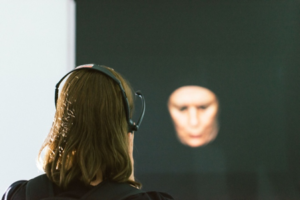
Image Credit: Courtesy of Keelan O’Hehir 2016
Articulating Print Practice (section 5)
Within this course you will learn how to articulate your concepts and ideas through print theories, related materials and methods of production. You will acquire a capacity to formulate and articulate a conceptual foundation for your art practice, and to make appropriate decisions as to which mediums and presentation methods best translate your conceptual premise.
Through group presentations and individual tutorials, you will establish a capacity for identifying not only the strengths and possibilities, but also areas for improvement, in both your own and fellow students’ art practice. You will be instructed in how to articulate these both verbally, and in written form. You will continue to refine your technical skills in order to produce a resolved body of work, as well as develop an understanding of the possibilities offered by the expanded nature of print media and its various positions within contemporary art practice.
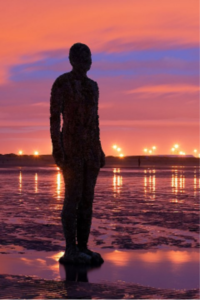
Antony Gormley 1997,Title - Another Place, Location - Crosby Beach,Lverpool,UK , Material - Cast Iron, Image credit - Andrew Dunn 2005, CC-by-sa-2.0
Body and Space (section 11)
This subject develops knowledge and facility in the study of the human body and its spatial context. It provides practical and theoretical methods for translating the body in space employing analytical, technical and interpretive processes. Over the course of the semester a series of studio classes, theoretical seminars and projects will address both contemporary and historical perspectives.In this course you will develop knowledge and skills in the study of the human body and its spatial context. It will provide you with practical and theoretical methods for translating the body in space employing analytical, technical and interpretive processes. The emphasis in this course is on the processes that underpin the realisation of the human body in space, a conception that encompasses private and public space, internal and external space, iconography, narrative, style and craft of artists, works and themes or ideas and begin to build an archive of research material to draw on in the future.
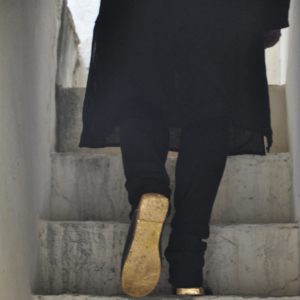
Rhett D’Costa, Ambulation, 2017, Inkjet photographic print, Image courtesy of the artist © Rhett D’Costa
Culture & Identity (section 3)
This course draws on the rich and diverse field of culture and identity as it relates to contemporary art practice. Both words ‘culture’ and ‘identity’, potentially traverse a range of issues ranging from the social, personal, historical, geographic and the political. The field, which this course navigates, is complex and extremely relevant to contemporary art. Artists have an important role to play in interrogating and shaping this discourse. The course will be delivered primarily through group tutorials, where you will present your artworks for critical review by your peers and teaching staff. This will be supported by class discussions and student presentations that focus on supporting the development of a body of exploratory and experimental artworks relating to your individual interests and interpretation of the course thematic. You will be encouraged to find your own way to draw from this rich field of research and interpret ideas as it relates to your own individual art practice.
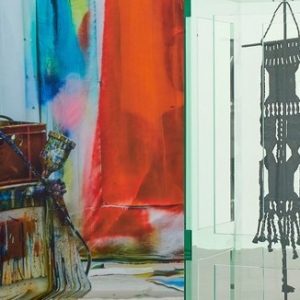
Installation view ©Katharina Grosse and VG Bild-Kunst Bonn ©Tatiana Trouve
Detail Gargosian at Art Basel November 2019
Expanded Painting (section 13)
In this course you will be encouraged to develop a strong, sustainable working process through your own individualised visual research, leading to a body of experimental and resolved works in media appropriate to your individual projects. Through visual lectures, references and gallery visits, you will develop your understanding of how your work is positioned within current conceptual debates concerning the expanded field of painting and related practices. In response to a series of generative propositions, you will be invited to experiment and play in order to expand your range of visual and material strategies. You will explore the interplay of art and technology, ecology, science, philosophy and popular culture amongst other contemporary ideas, focusing on painting, drawing, performance, installation, abstraction, narrative and the human image, Supportive individual and group tutorials, student presentations and visual lectures, will deepen your capacity to engage in productive critique and participate collaboratively in your chosen field.
This course aims to further develop your individual practice by identifying and building upon your strengths as a professional artist.
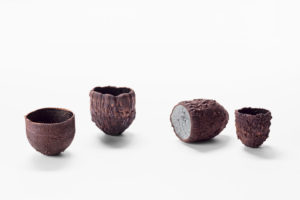
Rosemary Gunzburg 2017
Jewellery & Object Major Research Project (section 6)
In this course, you will undertake a semester long research project to produce a "Research Archive" and "Final Resolved" works. During this time you will choose your own subject to explore that is relevant to the direction of your work. This will include identifying the topic, technique and material for exploration. You will develop methodologies in your "Research Archive" to incorporate into and develop a "Final Resolved" group of both jewellery and object based works. This course will assist in developing your ability to identify an area of research, conduct experimentation and then document that research. This major project will be integral to your ongoing creative practice and will assist you in developing your artistic position and the directions of your future work. This course is suited to students from Gold & Silversmithing and those who have taken the elective Jewellery Fundamentals. You will need jewellery tools and materials in this course, please email the Gold & Silversmithing Studio Leader for more details.
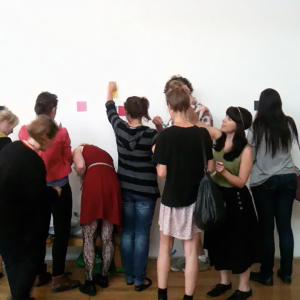
Image Credit: Student group drawing. Photography Greg Creek
Local and or General: Global drawing studio (section 8)
In this course you will explore ideas of contemporary art practice that may be drawing medium based or extended across other materials and mediums, conventions or processes. You will investigate thematic and self-directed projects that address meaning within the production and exhibition capacity of your emerging art practice. We work in a critical time where histories and narratives cross boundaries. How do we think about and make art that is meaningful to our immediate context but sharing in global dialogues? You will explore personal, public or political ideas relevant to your studiowork leading to the development of resolved and self-directed projects. We will also offer collaborative drawing with international student peers as an extension of your studio-based practice. Local and or General will consolidate and extend your emerging self-directed practice leading to a deeper understanding of relations between the contexts of making and meaning. You will position and test new ways of making your work, navigating the path from studio to installation.
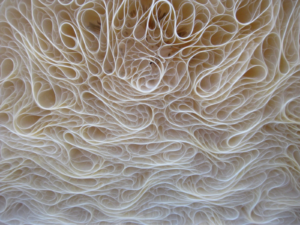
Tara Donovan Untitled 2008 polyester film By Ryan Dickey at https://www.flickr.com/photos/
meesterdickey/4126002035/in/photostream/ Creative Commons Attribution 2.0 http://creativecommons.org/licenses/by/2.0
Material Thinking (section 12)
The starting point for this course is the contemporary history of materiality in works of art. It examines the social and political meaning of materiality embedded in the art object with a focus on sculpture and installation art. It explores more traditional views of materiality in the context of a re-evaluation of their importance within contemporary art. This course will involve experimentation with materials, forms and technical skills, through innovative thinking, to produce works that reflect your interests. Conceptual and technical skills will be acquired through sequential projects and workshops that explore a wide range of spatial practices. You will learn to critically evaluate your work alongside other students in your group.
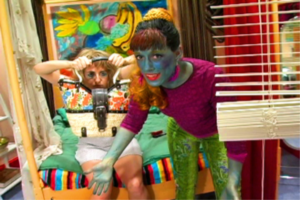
Ryan Trecartin, I-Be Area, 2007
Pop & Trash (section 9)
This course explores the hierarchy of visual culture and the complexity of ideas surrounding how high/low culture, value/non-value, taste/anti-taste can inform and extend a contemporary art practice. Other topics include appropriation, remix, sub-cultures and how gestures of the Avant Garde can all be explored to develop a critical language around Pop & Trash culture within a contemporary art practice. One of the central focuses of the course looks at the dissolution of so called high and low culture and how culture itself is now increasingly pop.
This course is not medium specific, and it is encouraged to explore Pop & Trash culture through a variety of different media, from drawing, installation, video, panting, photography, sound. The course is delivered through a series of group presentations, studio, individual tutorials, screenings, lectures and gallery visits.
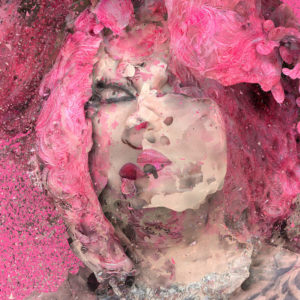
Still from Virtual Drag by Alison Bennett, Megan Beckwith & Mark Payne
Print as Other: Gender and Queer Strategies for Art Production (cancelled)
In this course, you will engage with contemporary art practices that deploy ‘otherness’ as a point of departure, with specific attention to gender and queer discourses that generate spaces beyond arbitrary cultural norms. You will focus on reproductive technologies such as printmaking and photography that challenge the status of the unique art object and have associations with feminine and feminist values.
In this context, you will be challenged to research other practitioners' methodologies and experiment with processes beyond your current practice. You will be directed to appropriate resources and instructed in divergent methods sensitive to the needs of your practice. You will participate in group critique sessions as well as individual tutorials to assist you in contextualising your work in relation to historic and contemporary art practices that engage with positions of ‘otherness’. You will develop a strong folio of work and transition towards becoming a self-managed art professional.
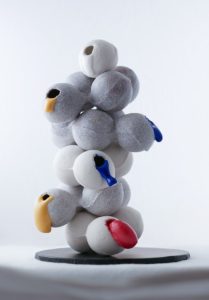
Kristin Burgham 2017
Researching the Ceramic Process (section 2) CANCELLED
In this course you will undertake a semester long research to produce an archive of your process. You will extensively research an area of direct interest to you and your ceramic practice. This course will assist in developing your ability to conduct and document research that is integral to the ongoing practice in all creative disciplines. You will choose a topic that is relevant to the current direction of your work and that will engage you physically and mentally.
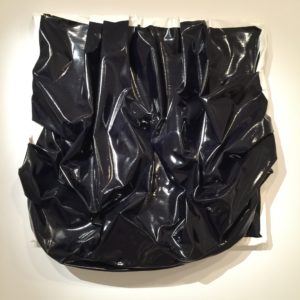
Angela de La Cruz, Loose fit (Blue) 2002, oil on canvas, NGV, collection.
Photograph, Peter Ellis
Studio Abstraction (section 1)
In this course you will engage with a wide range of concepts and material investigation into abstraction and non- objective art practices, leading to an individualised studio practice.
You will produce experimental research work that emphasise the importance of materiality, scale, colour, composition, pattern, structure, surface, matter, Zen, calligraphy, gesture, play and chance associations. The rich legacy of Western Modernist abstraction and Contemporary abstraction will be at the core of your studio work. You will experience a variety of strategies to generate new ideas, concepts, techniques and material process in a variety of media. You may experience the use of abstraction through, painting, print and digital technologies, drawing, collage, frottage, photography, the object, installation and other media. The use of found objects, photography, nature, urban environments, signs and symbols, ephemeral works, response to sound and light may be stimuli for your production of work. You will develop a draft studio work proposal that is directed to your own individual studio work. You will experience student presentations, visual lectures, individual and group tutorials and feedback and field trips to exhibitions in a supportive stimulating environment.
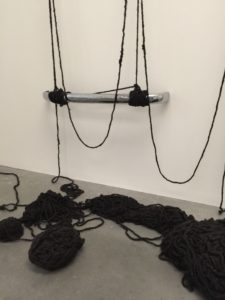
Image Credit: Sheela Gowda, Behold, 2009, Human Hair and Car Bumpers, Collection TATE Modern London UK, Photography Peter Ellis
The Art of Everythingism (section 15)
Perhaps we can do everything at once? In our times where all things seem to be perpetually unfolding, fragmentary and replete with changing perspectives, it certainly feels like we should. Perhaps we should be understanding and expressing all things at all times, wholeheartedly embracing an internet frame of mind. The English philosopher Peter Osbourne, in thinking about how we might grasp the character of our times, considers that our current period can be understood through conjunctions (Osborne, 2018). Referred to as contemporaneity, we experience the coming together of different but equally present temporary states. Therefore everything, the whole shebang, all societal political events and cultural occurrences are now seemingly formed within one labyrinthine and free flowing ever changing movement as an ongoing fragmented flow of everything; but not really heading anywhere, just changing.
This course is designed to develop your individual studio work through an exploration of the diversity of contemporary painting, drawing and media. Stimulated by a series of visual lectures and propositions, you will develop works that are inclusive of current conceptual and material issues, such as the idioms of painting, drawing, installation and the moving image.
Building upon your strengths, you will be encouraged to develop a strong, sustainable working process through your own individualised visual research, leading to a group of resolved works in media appropriate to your individual projects. Experimentation and play with concepts, materials, techniques and processes is encouraged to develop new ways of reflecting on and critiquing your practice in relation to our current times.
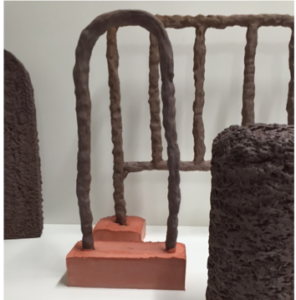
Image Credit: Caelan Renfree Dyer, Untitled, 2017, clay and plaster
The Narrative Through Clay (section 14)
In this course, you will undertake a series of guided creative projects where you will explore how the ceramic object can convey narrative. From these projects students will develop and extend a concept into a personal methodology of making.
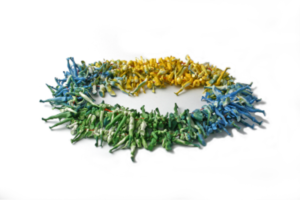
Lisa Walker, Playmobile, plastic, cotton thread, 2010, Collection National Galleru Victoria
The Ready Made in Jewellery and Object (section 7)
In this course students will investigate the place of the collected object in jewellery and object creative works by examining contemporary artists who engage with the ready-made, as well as looking at historical examples. Students will experiment with different methodologies and explore how the pre-existing object can be altered and adapted to create new work. They will consider how the viewer engages with the artwork through the pre-existing narratives and inherent material qualities present in the collected objects. This course is suited to students from fine art and those interested in exploring the materiality and manipulation of found objects to create jewellery and objects.
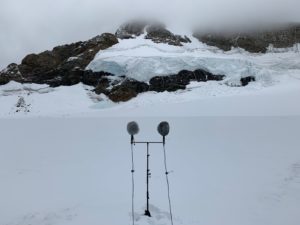
Atmospheres and Disturbances, Philip Samartzis, 2019
Time Based Practice (cancelled)
In this course you will explore processes which use duration and/or the manipulation of time as an essential element engaging with mediums such as sound, performance, improvisation, installation, video, and site-responsive art. During the semester you will develop works that consider the methodologies, strategies and problematics of Time-based practice through action, recording, composition, process, exhibition, and archive. You will be asked to consider what it means to experience/perform/listen to an artwork unfold over time according to the temporal logic of the medium, and also to engage in the historical and cultural legacies related to temporal art practices. Building upon your strengths, you will be encouraged to develop a strong sustainable working process through your own individualised creative research, leading to a group of resolved works in a format appropriate to your individual projects. Experimentation and play with time-based concepts, techniques and processes is encouraged to develop new ways of reflecting on and critiquing your practice. Supportive individual and group tutorials, lectures, collaborative workshops, technical demonstrations and individual studio work complement this course.